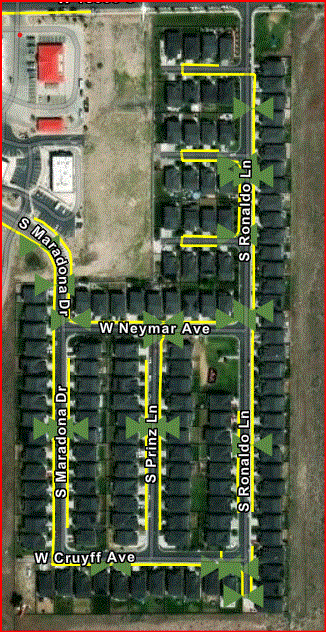
All West Fiber
All West Fiber wants to expand their fiber network into our community, but they need our permission to do so. Herriman has granted All West access to use public utility easements (PUEs) and City-owned underground fiber conduit. PUEs typically extend beyond the public right-of-way and into private property, where power, sewer, and gas lines are located. Installation will include digging, trenching, and installing pedestals and/or vaults. As with any construction, All West must restore any property disturbance resulting from construction.
All West Communications offers Internet, TV, and Home Telephone.
All West Fiber's Internet packages are $65 for 1000 Mbps download/upload speeds, $85 for 2000 Mbps download/upload speeds, $120 for 5000 Mbps download/upload speeds, $145 for 8000 Mbps download/upload speeds.
Add a home phone to any internet package for $18.95.
There are 3 TV packages available to add to any internet package.
If you like your current Comcast or CenturyLink (or whomever) connection, stay with them. Allowing All West Fiber to build their network in here would simply give each homeowner another option for an Internet Service Provider.
The yellow lines are their main lines and the green triangles are their connection points
Fiber Deployment FAQ Guide
What method will be used to deploy fiber?
Fiber is typically installed using trenchless boring technology, which minimizes disruption. Crews bore underground at depths of:
- 18-24 inches in grass
- 36 inches under roads and driveways
This avoids cutting through asphalt or sidewalks and protects surface infrastructure.
How do you locate utilities and avoid damage?
We follow safe dig practices and request utility marks from local services. This identifies gas, sewer, water, power, and communication lines. Homeowners are asked to mark private lines such as sprinkler.
What happens if sprinkler lines or landscaping are damaged?
Crews take precautions to avoid damage, including:
- Surveying yards
- Preserving topsoil
- Repairing damaged sprinklers
- Restoring areas with seed/sod
Homeowners are encouraged to water the area post-installation. If damage occurs, it’s addressed promptly.
Will fiber be installed before residents sign up?
No. Fiber drops to individual homes are only installed after a resident signs up. However, backbone infrastructure may be built in public easements beforehand.
Where will equipment be placed on the home?
Technicians aim to place equipment near existing telecom gear. If contact with the homeowner isn’t possible, standard placement practices are followed.
Equipment includes an ONT (modem), typically installed at a single point inside the home.
What are the speed guarantees and service quality?
Fiber offers symmetrical speeds (same upload and download). For example, 1 Gig service delivers 1 Gig up/down under normal conditions.
Can the system be scaled for future speed upgrades?
Yes. Fiber infrastructure is designed to scale. If demand increases, speeds can be increased. Agreements can be revisited to ensure communities remain competitive.
What is the installation timeline and duration?
Timelines vary based on community size, permitting, and access. In gated communities, coordination with HOAs for gate codes or access can affect schedules. Construction maps and detailed timelines are typically shared in advance.
How do you communicate with the HOA and residents?
HOAs receive:
- Welcome packets
- Construction maps
- Project timelines
Community managers stay in touch throughout the build, and crews operate respectfully. Virtual or in-person meetings are offered to address concerns.
Pre-Installation Utility Marking
Once a resident requests service from All West, locate crews, sourced by local utility providers and other telecom companies, will mark underground lines such as gas, water, power, and communications. This ensures safe installation and avoids damage.
Fiber Drop Scheduling
Our drop crew typically buries the fiber line to your home 1–2 days before your scheduled installation appointment. You do not need to be home during this step.
Installation Appointment Requirements
The installation averages around an hour in duration. An adult over the age of 18 will need to be home for the installation appointment.
Survey (1 response per household)
